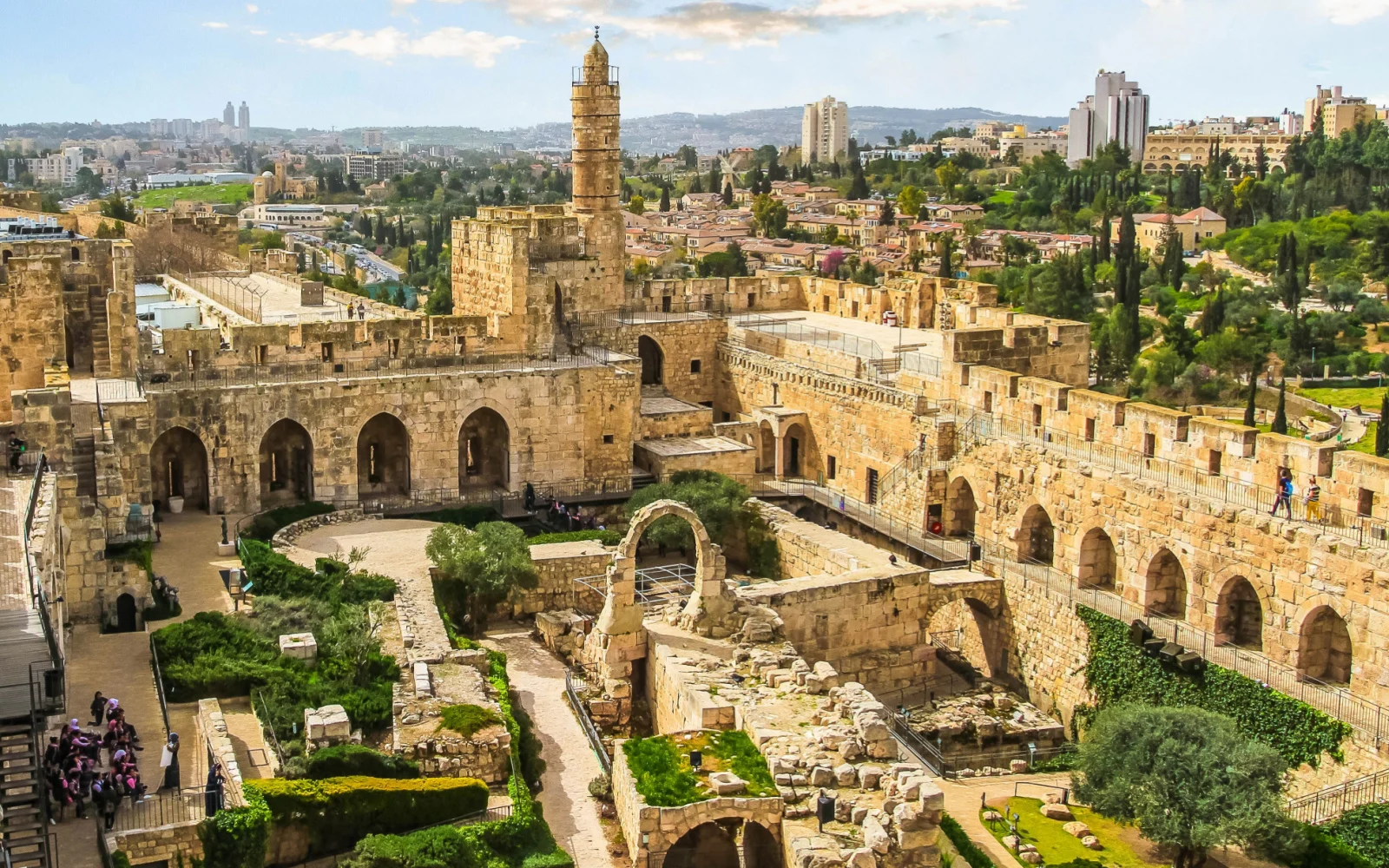Jerusalem is central to several of the world’s largest religions, including Judaism, Christianity, and Islam. Many people make once-in-a-lifetime pilgrimages to this holy city.
Since the voyage is so meaningful, you’ll want to ensure that you visit during the best time of the year. You might be surprised to learn about weather patterns and crowds at various times, so research is critical before booking your trip to Jerusalem.
We’ll show you the best time to visit Jerusalem, whether you’re going for religious reasons or just to see this historic city. We’ll also clue you in on the worst times of year to visit. Let us be your guide!
Overall Best Time to Visit Jerusalem
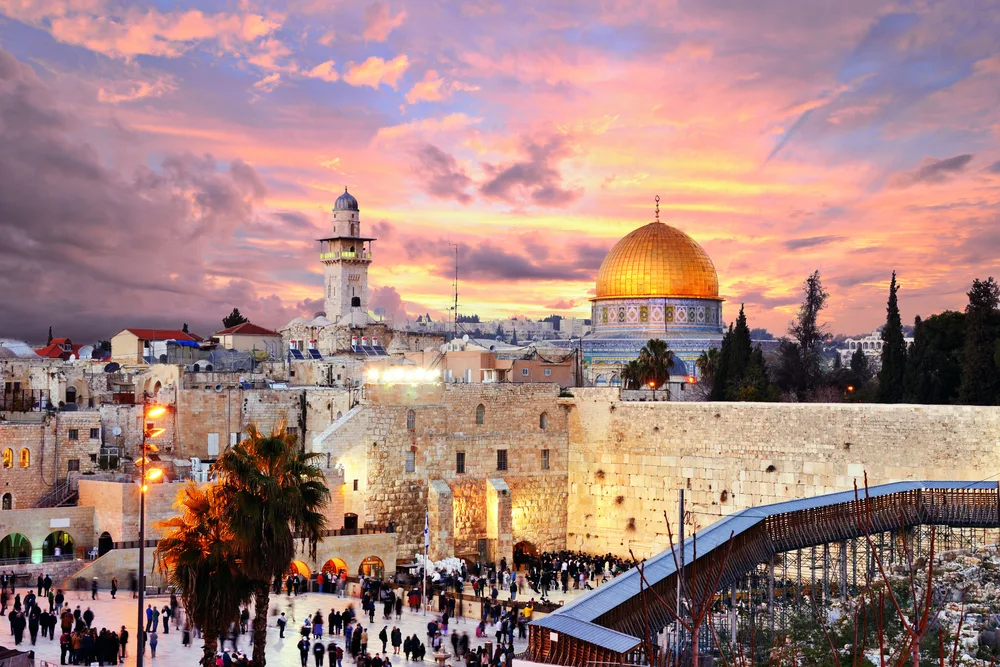
Sean Pavone/Shutterstock
The overall best times to visit Jerusalem are April, May, October, and November. During these months, you’ll experience pleasant weather and smaller crowds, especially at the major tourist sites.
When many people think about the weather in Jerusalem, they imagine the sweltering summers, which are real. But the rest of the year is more temperate.
During these four months, average temperatures usually don’t fall below 50 degrees Fahrenheit, even at night. Highs in the pleasant mid-70s are typical during the day, but pack a light jacket.
Summer is the peak tourist season in Jerusalem, as it is in many places. Westerners, in particular, take advantage of the time off from work and school to travel. Since April, May, October, and November are busier months for many families, Jerusalem sees fewer visitors.
A critical note about visiting Jerusalem: Before booking your trip, always check the Jewish, Christian, and Muslim calendars to see when the major holidays fall.
While most are outside these best months to visit, it occasionally happens. Expect bigger crowds and higher prices, especially for hotels.
Many Israelis and religious people from nearby countries make the journey for these holidays in particular:
- Epiphany (Christian, January 6)
- Ash Wednesday and the start of the Lenten season (Christian, usually begins in February or March and lasts until Easter)
- Purim (Jewish, usually in March)
- Ramadan and Eid Al-Fitr (Islamic, a month-long celebration usually late March-April)
- Good Friday and Easter (Christian, usually late March or April)
- Eid al-Adha (Islamic, usually late June)
- Rosh Hashanah (Jewish, usually in September)
- Yom Kippur (ten days after Rosh Hashanah)
- Sukkot (Jewish, usually September-October)
- Hanukkah (Jewish, December)
- Christmas Eve and Day (Christian, December 24 and 25)
Cheapest Time to Visit Jerusalem
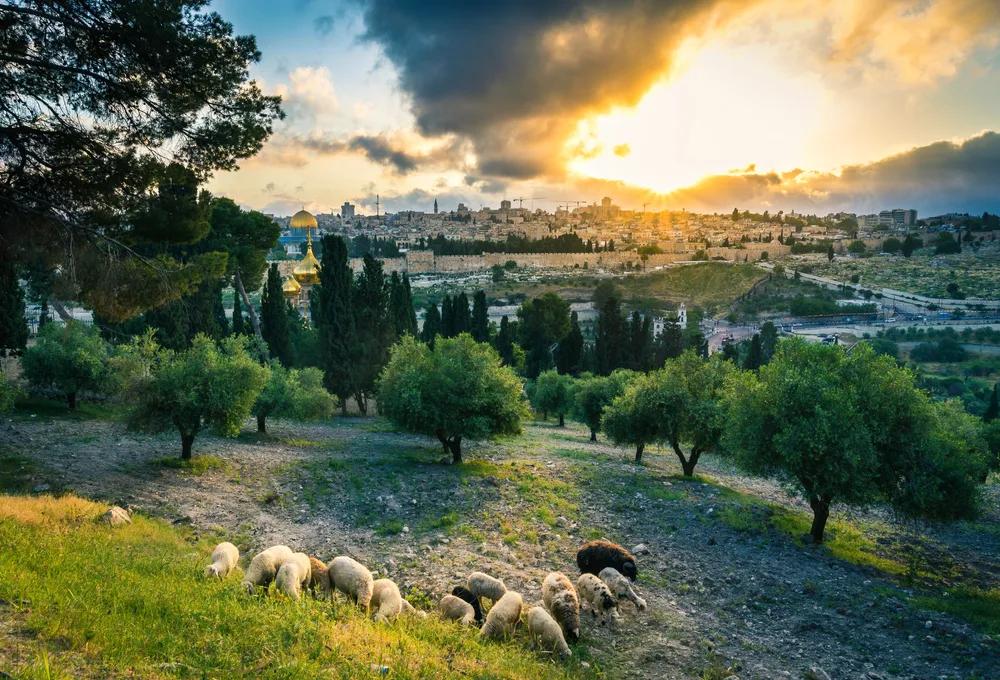
John Theodor/Shutterstock
If you hope to travel to Jerusalem but don’t have much money to spend, your best bet is to visit in the winter, from November through March. This time of year is more affordable because of the weather.
Not only are temperatures lower (average highs in the 50s and 60s), and it’s also the rainy season. December, January, February, and March see 3.5 to 5.25 inches of rain each month. If you visit at this time, plan for some rain.
Hotel prices tend to be lowest during the winter, but you can still visit all the major tourist attractions. In fact, people sensitive to the sun and heat may prefer visiting during the winter months. There are very few activities that become unavailable in the winter.
Of course, the exception is the holidays that fall during these months, especially Hanukkah, Christmas, and Purim. Hotel prices spike right back up with the influx of tourists. If you enjoy large festivals (especially with costumes), consider visiting for Purim.
Least Busy Time to Visit Jerusalem
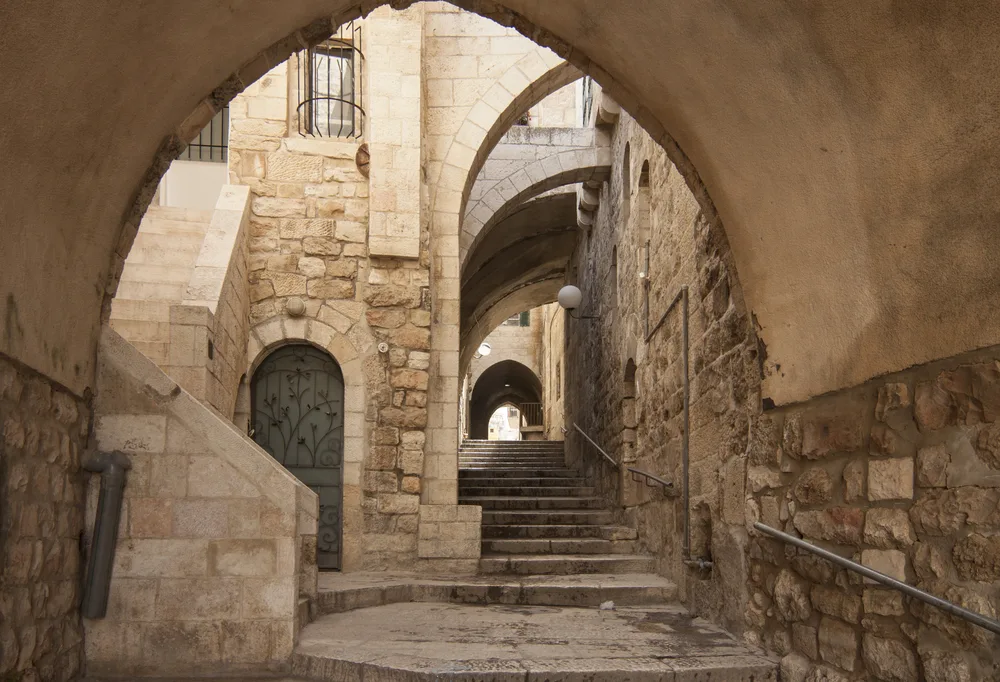
Denis Kabanov/Shutterstock
The least busy time to visit Jerusalem is also in the winter, especially January, February, and March. December is a little more active because of Hanukkah and Christmas travelers, but after the New Year, things get quiet again.
Winter tends to be a hectic time for families. They spend holidays together, kids have school events, and yucky weather can make air travel risky. Many opt to save their vacations for the spring and summer.
As discussed above, the weather in Jerusalem at this time is less than ideal. It’s colder than comfortable for many people, especially at night. Winter also tends to be rainy.
Since many of Jerusalem’s most popular sites are outdoors — including the Western Wall, Temple Mount, and the many outdoor bazaars and markets–rain can become a serious impediment.
It’s crucial that we mention that there isn’t a “dead” season for Jerusalem. The truth is that this holy city sees throngs of tourists year-round. Additionally, tourism picks up through the winter as the weather gets warmer.
Purim in March (especially when it falls mid-month or later) is sometimes thought of as the unofficial start of tourist season in Jerusalem.
You also won’t be a lone visitor to any major sites if you come in the winter, but the crowds will be smaller, giving you better opportunities to get close to some of the most fascinating things to see.
Finally, Jerusalem is a major city in a part of the world that can already get crowded. It’s Jerusalem’s most populous city, at nearly 900,000 residents, most of whom are there all year. That contributes to the crowds.
Worst Time to Visit Jerusalem

Jerusalem, Israel – April 26, 2018: Jaffa Street after a heavy rainfall/Seth Aronstam/Shutterstock
There isn’t a bad or wrong time to visit Jerusalem. If you have the opportunity to visit this amazing city, we recommend you take it. We’ve identified the spring and autumn months — April, May, October, and November — as the best times to visit.
That’s when crowds and temperatures are a little more moderate. Winter and summer have more drawbacks, though. As discussed, the winter gets rainy and colder than the rest of the year.
For many travelers, that makes it a bad time. But for others, summertime’s intense heat and sun can be a major deterrent. You won’t get a lot of rain, but temperatures will be in the mid-80s almost daily.
Summer is also very crowded, but some tourists like a lot of action and excitement. Business owners, local organizations, and the local government host events and offer specials during this busy time. It’s exciting and diverse, which is some people’s ideal scene.
Things to Consider
There are several things to consider when planning a trip to Jerusalem, especially if you’re deciding when to go:
- The weather. Summers are hot and dry, winters are cool and rainy
- Crowds. Tourism peaks in the summer months
- Holidays and holy seasons. You may want to plan to attend one or avoid them altogether
- Guided tours. Many of Jerusalem’s most significant sites, especially the religious ones, are better with a guide who can explain their importance historically and to all faiths.
- Day excursions. Decide whether you want to take a day trip from Jerusalem. Some of the most popular are the Dead Sea, Nazareth, Jericho, and Caesarea.
A big decision for many travelers is also whether to plan a trip on your own or go with a guided group. Many religious organizations sponsor trips for their members.
It mainly depends on what kind of experience you want and how much freedom you like to enjoy on vacation. Jerusalem is exotic to many people who would prefer to visit with others. But some don’t like to follow itineraries or be tied to a schedule.
Frequently Asked Questions
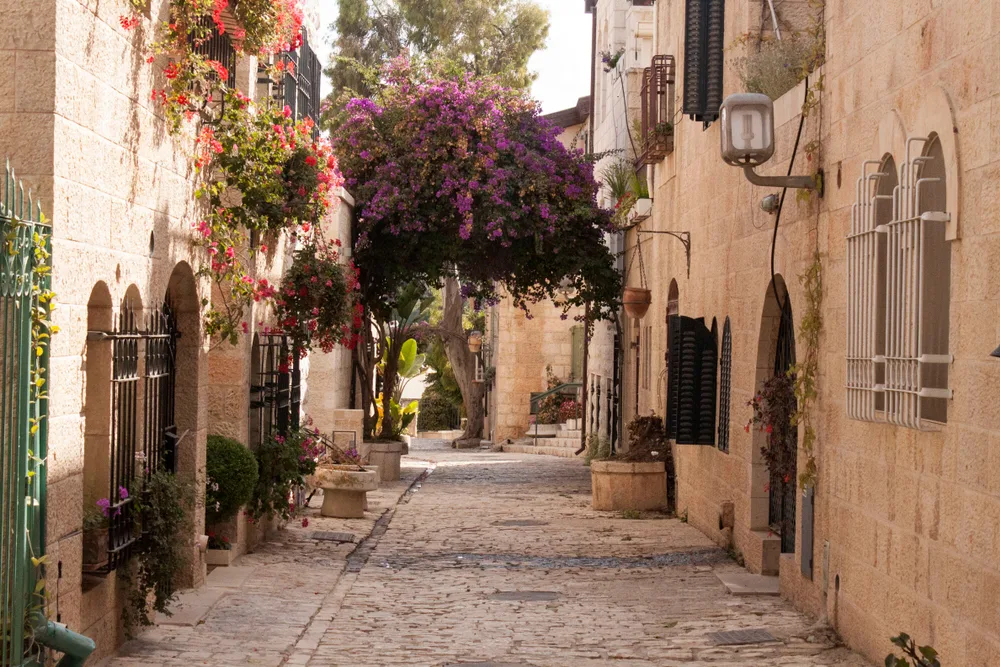
Marcel Pi/Shutterstock
Before we go, read answers to some of the most common questions about traveling to Jerusalem:
Do Americans need vaccinations or special documentation to travel to Jerusalem?
Americans don’t need special vaccinations, but you should be up to date on all your shots. The CDC also recommends COVID-19, Hepatitis A, and Hepatitis B.
Ensure your polio vaccine is good, and consider typhoid if you plan to leave the city. You don’t need any documentation besides a valid passport.
Where is the best part of Jerusalem to stay?
The best part of Jerusalem to stay in is the Old City. It’s home to some of the city’s most famous and historic sites. However, it’s small, so accommodations can get pricey. Check outside the city walls in West Jerusalem, too.
Is Jerusalem safe?
In general, the Middle East has a poor reputation regarding safety. However, Jerusalem is a very safe city, with crime rates lower than some major American cities.
Of course, every metropolis has its less desirable areas. Stay near the tourist sites and ask your hotel concierge before going to a new part of the city.
Should you visit Jerusalem with a religious group or on your own?
It depends on the kind of experience that you want. If you want to see the city through a particular religious lens, then go with a religious group. They will focus on sites and narratives that hold significance in your faith tradition.
Is Jerusalem good for kids?
Yes! Some families are surprised at how family-friendly they find Jerusalem. But since families are at the heart of Israeli life, it makes sense.
One of the best things about Jerusalem is that bringing your kids almost anywhere is acceptable. There aren’t a lot of spaces reserved for adults only, and places like museums cater to kids.
Over to You!
The best times to visit Jerusalem are April, May, October, and November. The weather is pleasant, and the crowds are manageable. That said, Jerusalem is an immensely significant city for many reasons, and there isn’t a bad time to visit.
Even though it might be hot (or even a bit chilly) and crowded, Jerusalem is still worth visiting if you have the opportunity. So, with so much to see and do and no real bad time to visit, what are you waiting for — book your trip today!



